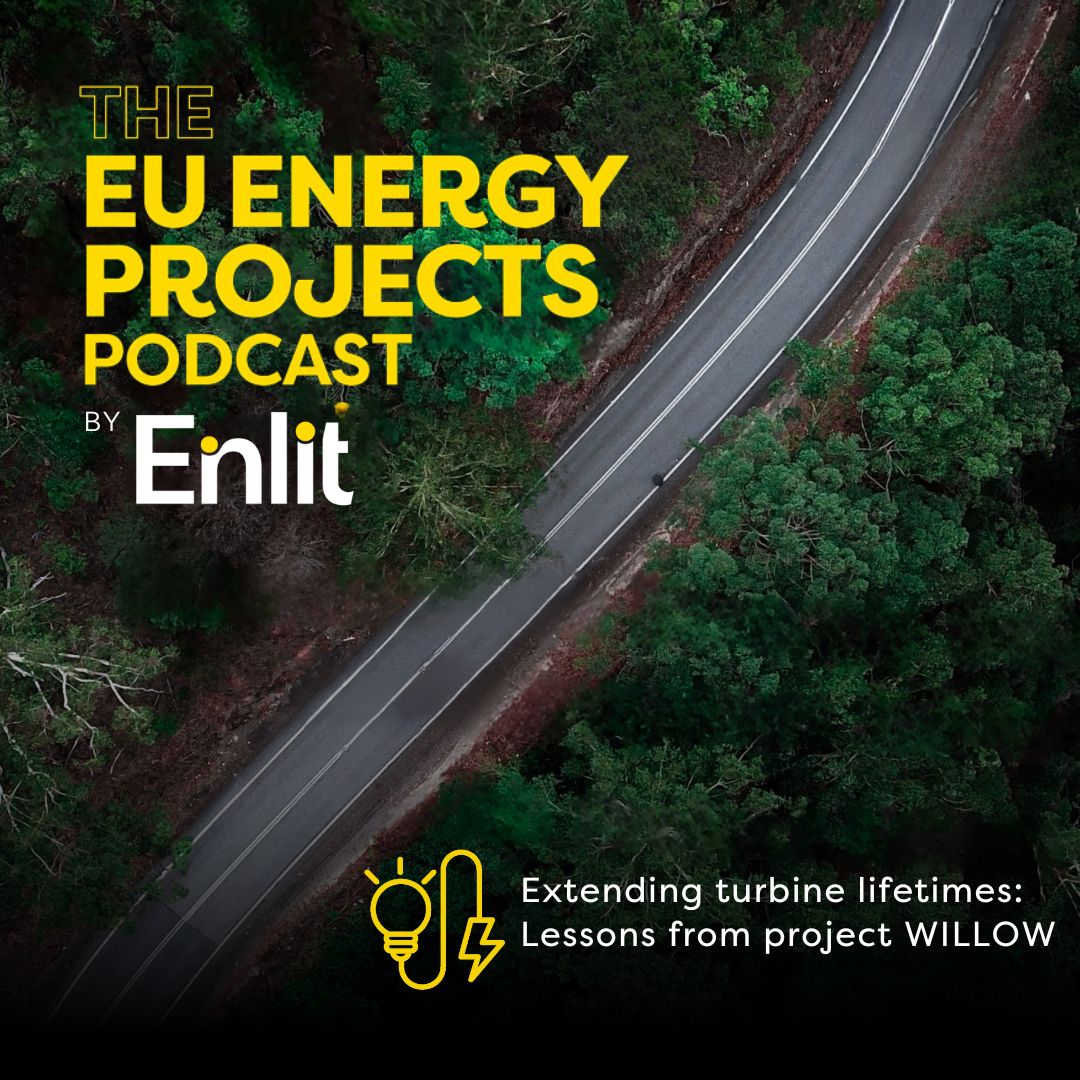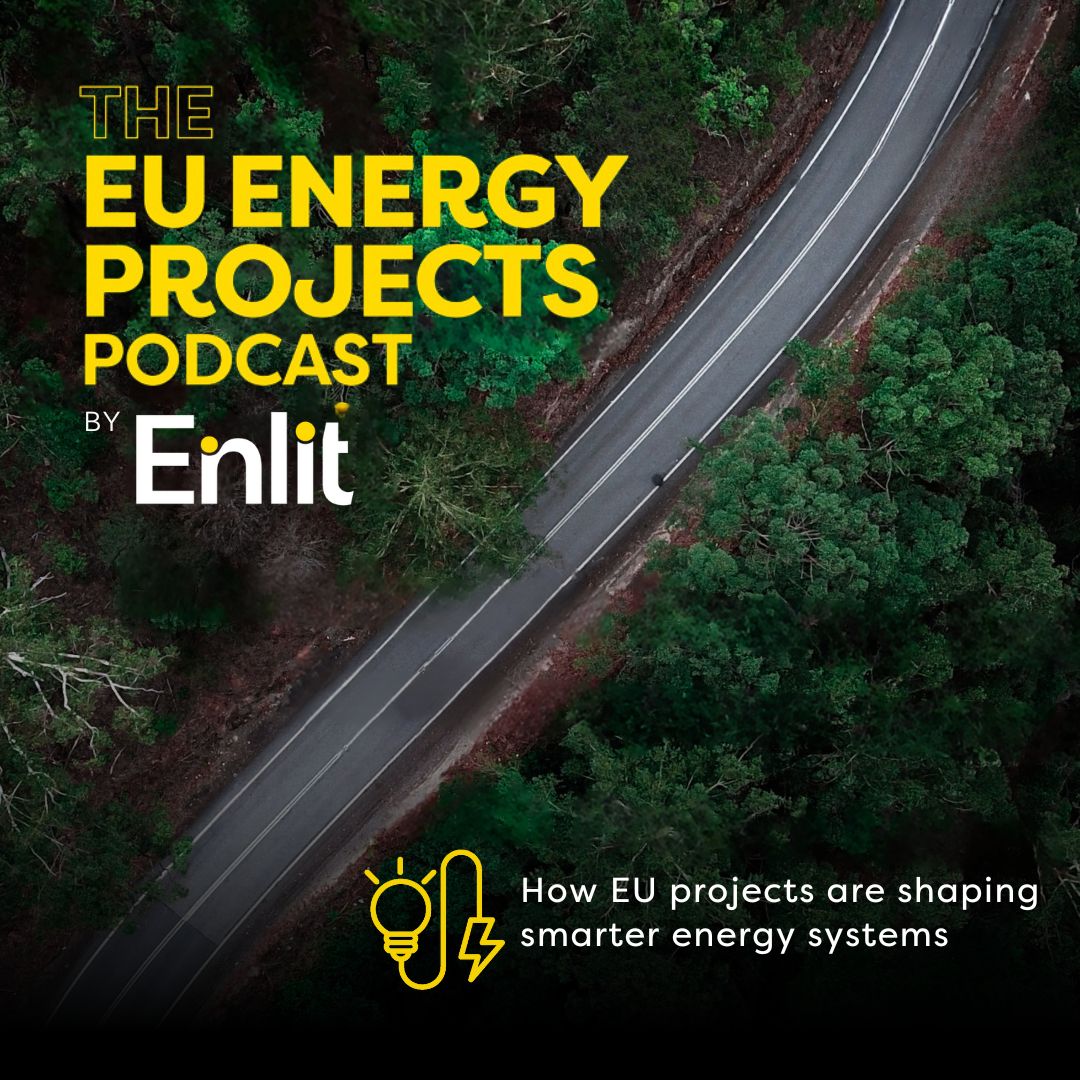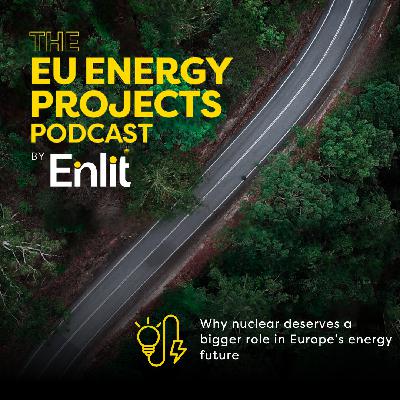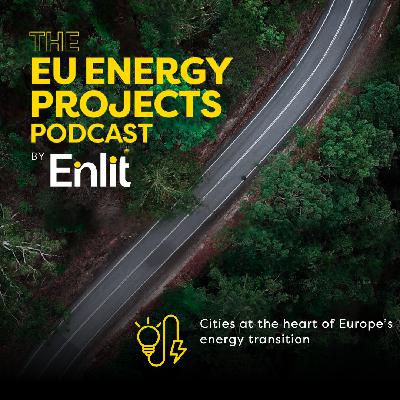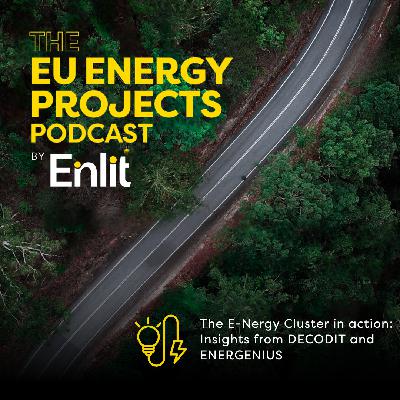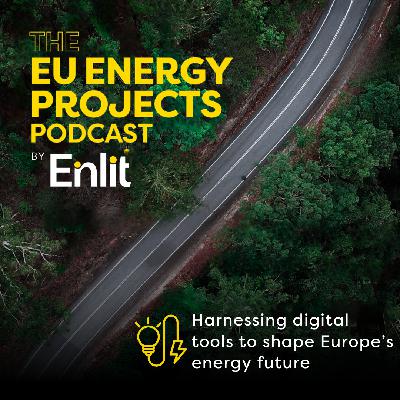Discover The EU Energy Projects Podcast
The EU Energy Projects Podcast

The EU Energy Projects Podcast
Author: Enlit Europe
Subscribed: 5Played: 68Subscribe
Share
© 2024
Description
The EU Energy Projects Podcast is an insider’s look into the world of EU-funded projects transforming the energy sector in Europe.
Every fortnight we focus on a new topic in the energy transition and talk to representatives from projects that are enabling the transition to green energy by finding solutions to the sector’s most pressing problems.
The EU Energy Projects Podcast s brought to you by Enlit Europe and is curated and hosted by EU Projects Zone Editor and Director Areti Ntaradimou.
Every fortnight we focus on a new topic in the energy transition and talk to representatives from projects that are enabling the transition to green energy by finding solutions to the sector’s most pressing problems.
The EU Energy Projects Podcast s brought to you by Enlit Europe and is curated and hosted by EU Projects Zone Editor and Director Areti Ntaradimou.
93 Episodes
Reverse
In the latest episode of the EU Energy Projects Podcast, we revisit the EU-funded BEGONIA project to explore how it is helping lay the foundations for next-generation Operational Digital Platforms (ODPs) in the energy and transport sectors.
Unlike conventional research initiatives, BEGONIA was designed as a Coordination and Support Action, focused on preparing the ground for large-scale digital cooperation. As Niccolò Fattirolli, COO of Olivo Energy and lead for stakeholder engagement, explains, the project’s mission has been to identify best practices across Europe, develop promising use cases, and bring them close to real-world implementation.
In this episode of the EU Energy Projects Podcast, Areti Ntaradimou spoke with Leon Nielsen from CIRCE Technology Centre, a leading Spanish research and innovation organisation at the forefront of Europe’s energy transition.
The conversation explored how policy, technology, and collaboration intersect to shape a more sustainable, flexible, and resilient energy system.
Based in Zaragoza, CIRCE plays a crucial role in translating research into real-world solutions. As Nielsen explained, their work spans electricity production and storage, industrial decarbonisation, transport, digitalisation, and energy efficiency.
They discussed three flagship initiatives that illustrate this approach. Project Chronicle, Reflex and EFORT.
In this episode of the EU Energy Projects Podcast Jonathan Spencer Jones is joined by Ilias Zafieropoulos, Technology Director at Ubitech Energy and coordinator of the HYNET project. The interest in DC power systems has surged, driven by the growing use of power electronic-based loads and the increasing deployment of distributed energy resource, many of which operate in DC or include a DC stage. The HYNET project is one of a cluster of projects advancing DC technologies.
Catch up on the latest episodes: https://www.enlit.world/about-us/eu-energy-projects-podcast
In the latest episode of the EU Energy Projects Podcast, Areti Ntaradimou had the pleasure of speaking with Ainhoa Cortés, project lead of Project WILLOW, an EU-funded initiative tackling one of offshore wind’s most pressing and least visible challenges: how to balance energy production with the long-term health of wind turbines.
At the heart of the project is an ambitious integration of structural health monitoring, physical models, and AI-driven tools. WILLOW combines SCADA data, accelerometer readings, corrosion and coating sensors, and machine-learning models to produce far more accurate lifetime predictions. This makes it possible not only to detect damage earlier, but also to make smarter operational decisions. For example, curtailing a turbine already showing signs of degradation rather than one in good condition.
In this episode of the EU Energy Projects Podcast we’re joined by Juho Kivelä from the INDEPENDENT and RESONANCE projects and Joseba Jimeno from GLocalFlex and ELEXIA. Four projects belonging to the same cluster, namely the Energy Nexus Cluster. Their work drives Europe’s transition toward smarter energy management, flexible local energy systems, and cleaner, more connected urban environments.
In this episode of the EU Energy Projects Podcast, host Jonathan Spencer Jones speaks with Stavros Stamatoukos, Policy Officer for Digitalisation and AI at DG Energy, about the EU’s growing framework of policy and legislative actions on AI and digitalisation in the energy sector.
Recorded during Enlit Europe 2025, this wide-ranging conversation offers rare insight into how policymakers are balancing innovation, regulation, and system security in Europe’s energy transition.
Subscribe to the EU Energy Projects Podcast for more expert insights from policymakers, innovators, and industry leaders shaping Europe’s digital energy future.
In this episode of the EU Energy Projects podcast, Jonathan Spencer Jones hears from Eduard Escalona Zorita and Fernando Cassola how open-source space data can be used in the energy sector.
Over the course of less than a lifetime, space exploration has evolved from the launch of the first satellite to a multi-billion dollar/euro industry with ever increasing numbers of satellites providing round-the-clock services and scientific and other data on our Earth system.
As the data has become more sophisticated and diverse, it has attracted interest from multiple sectors for monitoring and management – not least in the energy sector with the increasing demands and complexity of the energy transition.
As the agency for the EU’s space programme, EUSPA provides a range of space-based services for public and private users, in particular based on the Copernicus Earth observation and Galileo global navigation programmes.
Ports are key hubs in the energy transition, at the heart of countries’ economies and with diverse energy users from heavy, energy intensive industries to small businesses and multiple transport types.
In this episode, Areti Ntaradimou speaks with Ivan Jimenez, President of the Port Authority of Bilbao about the BilbOPS project — a €115 million EU-backed initiative aiming to fully electrify the port by 2027, well ahead of regulatory deadlines, through a collaborative clean energy-sharing model.
In this episode of the EU Energy Projects Podcast Areti Ntaradimou is joined by Christos Christodoulou, coordinator of CABLEGNOSIS, a project developing next-generation power cable technologies to support Europe’s clean energy transition. From advanced materials to AI-based diagnostics, CABLEGNOSIS is helping build the reliable, renewable-ready grid that Europe needs for 2030 and beyond.
In this episode of the EU Energy Projects Podcast, Areti Ntaradimou had the pleasure of welcoming Mohaddeseh Maktabifard and José Luis Corrales Ciganda, both representing the inspiring 2Cool2Waste cluster; an initiative uniting EU-funded projects that transform waste heat from an overlooked by-product into a practical, clean-energy resource.
The discussion opened with Maktabifard briefly explaining what SEEDS, the project she coordinates, is about. Her description was a reminder of how much innovation is happening behind the scenes in our buildings. SEEDS pilots smart, cost-effective electrification solutions - hybrid heat pumps, building-integrated PV, advanced thermal and battery storage - across six European sites.
José Luis then introduced the two projects he represents: SynergyNet, which develops tools to optimise multi-energy systems, and Rewire, which focuses on thermally driven cooling technologies using waste or renewable heat. Hearing him describe the project’s progress, from preliminary sector analysis to detailed engineering at four demo sites, made the scale and complexity of these solutions feel very real.
In this episode of the EU Energy Projects Podcast, we are joined by Dr. Fridrik Larsen, one of Europe’s leading experts in branding and reputation management, as well as the Godfather of Enlit.
With deep expertise in brand positioning and stakeholder engagement, Fridrik has spent years helping organizations bridge the gap between innovation and public perception. His insights offer a valuable perspective on an often-overlooked element of EU-funded research and innovation projects: branding.
As Fridrik explains, while the principles of branding remain the same across sectors, energy presents unique challenges. “Branding is just branding,” he notes. “But energy is tied to politics, human rights and daily life in a way that few other products are.” This heightened sensitivity requires energy innovators to be especially mindful of how they communicate the origins, impact, and benefits of their work. Even so, the fundamentals, i.e. understanding your target audience, articulating a clear value proposition and maintaining a meaningful dialogue, remain essential.
In the latest episode of the EU Projects Podcast, Areti Ntaradimou sits down with Georg Hartner, representative of INSIEME, an ambitious Digital Europe action under the custody of DG Connect. The project’s mission is both visionary and deeply practical: to establish and deploy a common European energy data space by the sector, for the sector.
At its core, INSIEME brings together an impressive alliance; 54 key European partners including TSOs, DSOs, solution providers, flexibility service providers, market platforms, and leading digital innovators from across the continent. The project runs from April 2025 until 2028, addressing one of the biggest challenges facing the energy sector today: data fragmentation.
In this episode, Areti Ntaradimou spoke with Dr Devrim Murat Yazan, coordinator of the ambitious European IS2H4C project, short for Implementing Systemic and Sustainable Industrial Symbiosis for Hubs for Circularity.
At its core, IS2H4C aims to make the circular economy a practical reality. The project integrates advanced technologies such as carbon capture, electrolysis and digital tools, but it also recognises that true circularity depends on people, partnerships and policies. Aligned with the European Green Deal and the Circular Economy Action Plan, IS2H4C embodies Europe’s commitment to achieving long-term climate neutrality.
Dr Yazan highlights a growing momentum across Europe toward “systemic circularity”, where industrial, urban and rural systems are connected through collaborative hubs. Supported by the European Commission, IS2H4C is one of four large-scale projects designed to establish these Hubs for Circularity, turning policy ambitions into operational models for sustainable growth.
In this episode of the EU Energy Projects Podcast, we sit down with Manuel Gálvez to discuss what’s next for EU energy policy and why grids are at the heart of it all.
For Manuel, who is Senior European Affairs Advisor at Elia Group and Vice Convener for Policy within ENTSO-E’s Policy and Communications Group, the European energy conversation has clearly evolved. “A few years ago, the focus was on decarbonisation above all,” he says. “Today, competitiveness and security are equally pressing.” Recent geopolitical shocks have reshaped priorities, making energy affordability, security of supply and resilience central to Europe’s long-term strategy. But this, he emphasises, doesn’t mean Europe should lose sight of its green ambitions, rather, decarbonisation remains the foundation for competitiveness and stability.
In this latest episode of the EU Energy Projects Podcast, Areti Ntaradimou with Manuel Muñoz, coordinator of the EasyDC-FOS project, a European initiative that is redefining how we think about high-voltage direct current (HVDC) technology for interconnections and offshore grids.
As Europe moves toward a fully integrated and decarbonised energy system, HVDC infrastructure is no longer a distant vision, it is a necessity. The European Commission has set clear priorities on strengthening cross-border interconnections and offshore energy hubs, and projects like EasyDC-FOS are key to turning those goals into reality.
You will have the opportunity to talk to the EasyDC-FOS representatives and learn more about the project at the EU Projects Zone during ENLIT Europe 2025 in Bilbao.
In this episode host, Areti Ntaradimou had the opportunity to speak with Marina Aparicio Peña and Silvia Trevisan about the power and complexity of cross-border and cross-sector cooperation in advancing Europe’s clean energy transition.
Marina explained how the THUNDER consortium, supported by EU funding, unites partners along the entire value chain. From academic institutions providing foundational research, to industries ensuring real-world application and end-users validating performance. She described how this mix “reduces time to market and facilitates knowledge transfer”, aligning closely with the Commission’s broader innovation agenda.
Silvia, speaking about the SUSHEAT project, added that cooperation across sectors and borders helps tailor technologies to diverse European conditions, whether for industrial electrification or district heating systems. Her example of hybrid systems capable of adapting to local needs captured the essence of the EU’s ambition: flexibility through collaboration.
In this episode host, Areti Ntaradimou wanted to dig deeper into why conversations around Europe's energy transition lean heavily toward renewables like solar and wind, while nuclear is left in the shadows and whether new innovations could change the narrative. To do that, Ntaradimou spoke with Candice Boudet (CEA, SNETP) and Jan Prehradný (RCR, SNETP).
The Sustainable Nuclear Energy Technology Platform (SNETP) was established in September 2007 as a R&D&I platform to support and promote the safe, reliable and efficient operation of Generation II, III and IV civil nuclear systems. You can come see the project at the Project Zone at Enlit Europe in Bilbao, 18-20 November in Bilbao, Spain.
In this episode we put our focus on cities. The engines of growth, but also some of the biggest contributors to climate change.
With 70% of global energy-related emissions linked to urban areas, it’s impossible to imagine a low carbon future without cities leading the way.
To explore how this transformation is unfolding, Areti Ntaradimou spoke with Frans Verspeek, project advisor for the EU-funded ATELIER project.
ATELIER is pioneering the concept of 'positive energy districts'. That is areas where groups of buildings generate more energy than they consume, sharing the surplus with their neighbours.
In the latest episode of the EU Energy Projects podcast, Areti Ntaradimou had the opportunity to learn more about the E-Nergy cluster from guests Stratis Kanarachos and Kostas Arvanitis.
Energy clusters, promoted by the European Commission, are designed to create networks of cooperation that go beyond individual project boundaries. Instead of working in isolation, projects are joining forces to tackle shared challenges, amplify their voice, and reach citizens more effectively.
Enjoy the episode!
Dr Istvan Vokony, TwinEU Project Coordinator spoke to host Areti Ntaradimou about how technology itself is not automatically a solution. “I can utilise a new tool in an appropriate way, or I can waste it,” he explained.
The real value lies in deciding what data to collect and how to use it. Humans can process only a handful of information sources at once, but digital systems can handle hundreds. Done well, this means faster processes, lower costs, and decisions based on solid, real-time insights rather than guesswork.
This is where digital twins come in. Unlike traditional simulation models, which rely on assumptions, digital twins use live measurements.





